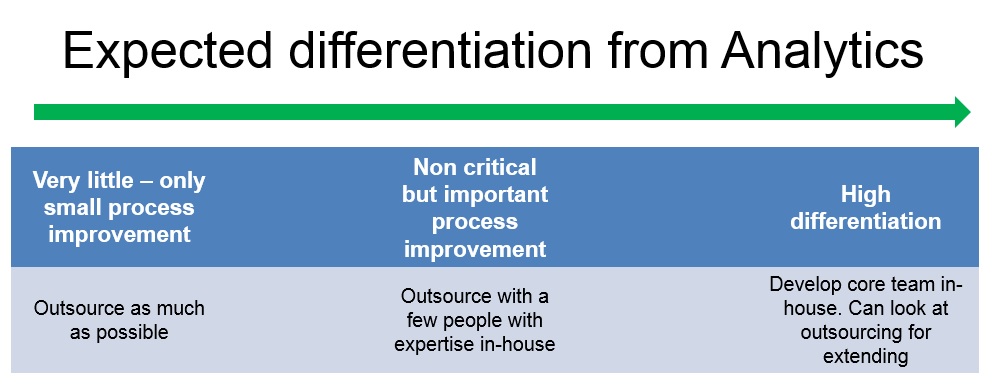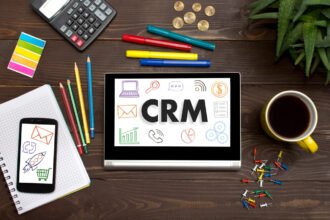Are you a business owner who is wondering how can Analytics / Big data help me out? Or you are convinced that data mining can add value, but clueless about next steps? or have you attended multiple conferences under the headline of big data, but still have little idea about how to start it in your own organization?
First of all, don’t be dis-heartened, you are not alone! Multiple surveys have shown that while there is a lot of talk on big data, only a few people are actually working on it.
Are you a business owner who is wondering how can Analytics / Big data help me out? Or you are convinced that data mining can add value, but clueless about next steps? or have you attended multiple conferences under the headline of big data, but still have little idea about how to start it in your own organization?
First of all, don’t be dis-heartened, you are not alone! Multiple surveys have shown that while there is a lot of talk on big data, only a few people are actually working on it.
This article lays out 5 questions every business head should answer before starting this journey. These questions are not a solution to your technical questions related to big data and would not provide you a remedy to all your questions but they will provide you enough stimulation to challenge and really understand the core of big data analytics proposition for you.
This might sound a really silly question to start with, but this is most powerful one as well. You need to look for an answer beyond your BAU business model. Let me give you a real life example to try and explain what I mean.
What business is McDonald’s in? If you said selling fast food, you’d be wrong. In 1974, Ray Kroc, the man who started the golden arch empire asked an MBA class at the University of Texas, Austin this same question. Of course, everyone said hamburgers. Kroc’s answer surprised everyone: he said he was in the real estate business.
Here’s the way he explained it: his primary business focus was to sell franchises of the restaurant. He knew, however that real estate and location were the most important factors of success for each franchise. A poorly placed restaurant would go broke. McDonald’s is now the single largest owner of real estate in the world.
Here is food for some more thought. List out what you think each of the business is in:
- Amazon
- Tesco
- Netflix
- Coursera
- You?
Look for an answer beyond the obvious. Netflix is not in business of renting out / streaming movies, it is in business of understanding viewing habits of people. Similarly, Coursera is in business of understanding learning behaviour of people.
So, now again, Which business are you in?
In answering so, you might figure out that the real differentiator to your business is different from the traditional business model you had in your mind.
In today’s landscape, a credit card provider is not in a business of a Financial risk management. It is important, but its true business is likely to be understanding consumer spending. If they provide a spending offer a month after the customer needs it, they are doomed!
Now that you have probably listed down which business are you in, you need to check how much data do you own in that business. Following are the questions you need to answer:
- Do you own the data and journey?
- If yes, can you increase the ownership? Can you store more information which can provide you information about what the customer wants?
- If no, how do you start owning the data and the journey?
- If you get insights on consumer behaviour, what kind of changes can you make today? What do you think is the potential revenue opportunity there?
The answer depends on how much importance / differentiating capability you attach to Analytics in your core strategy and how much revenue opportunity you put on it. While it is easy to take decisions on the extremes, it might be more difficult to make decisions if you lie somewhere in between. There are several hybrid models, which might work if you lie somewhere in between.
This might as well be a Question 3 b. Once you are clear whether you need to Outsource or not and in what capacity, you need to do a reality check versus your current talent pool. Needless to emphasize the importance of this step.
- Scenario 1: If you think you have the right talent in-house, you should ask:
- Why have we not started the journey already?
- What have been the results of past initiatives these people / team have led?
- Scenario 2: You do not have the right talent inhouse. In this case, create a job description, find out relevant candidates, take time to understand their perspective, involvement in transition in previous companies and ability to lead change.
Once you have all the above questions answered, you need to think about how would you go about penetrating Analytics to the level in your Organization you really want? Following are some of the guidelines in creating this action plan:
- Identify specific problems (hopefully core of what business are you in) and work on those problems
- Communicate your vision to your team and create a buy-in with them
- Identify a few low hanging fruits to increase engagement with business
Once you have answers to these questions, hopefully you will have all the weapons you need to create an action plan. Here are a couple of case studies with a few CEOs and their answers to the five questions:
Question 1: What business are you in?
There are 3 parts which define the core of our business proposition:
- Identifying the right risk profile of customers to be underwritten on right products
- Managing the customer life cycle effectively and efficiently. Some of the questions we try and answer here are:
- Can we anticipate when a good customer needs an offer to shift his big spends on to our cards?
- Can we identify transactions which illustrate worsening risk for customer?
- Managing Fraud:
- This is another space where application of big data comes in place. What are the patterns which might indicate dubious behaviour?
Question 2: Can data / behaviour insights change the way you do or look at your business?
- For us, mining data to bring out behavioural insights is the core of solving business problems. We place a very high value on any insight generated in each of these areas highlighted above. We typically own the entire data in this journey, which is a big advantage compared to some other industries. We are increasing moving to a space where data is looked at as an asset on Balance sheet of our Organization.
Question 3: Do you want to build in-house data capability or Outsource?
For us the answer was very evident. Once we were clear on the value, the question was about finding the right talent to build in-house capabilities.
Question 4: Do you need to invest in people or you have the required talent in-house?
We invested heavily in specialists to build our analytics expertise. The Leadership team was actively involved in screening the candidates themselves. Once the team was in place, managing their attrition has been a key priority for our Organization.
Question 5: What should be the plan for rollout of this initiative?
Since, we were convinced about the value Analytics can add and there are Organizations across globe who have already created differentiation based on data (e.g. Capital One, American Express), we started work on key strategic areas immediately. While we did not necessarily look out for low hanging fruits, speed to execution was really key for us. If we know about a trend which might signify potential fraud, it had to be implemented quickly. You cannot sit on information like this.
So, what do you think about these questions? Would they help you provide direction in setting up an Analytics practice? Are there additional factors you would want to answer in initial stages of starting a data practice? Do let me know your thoughts.









